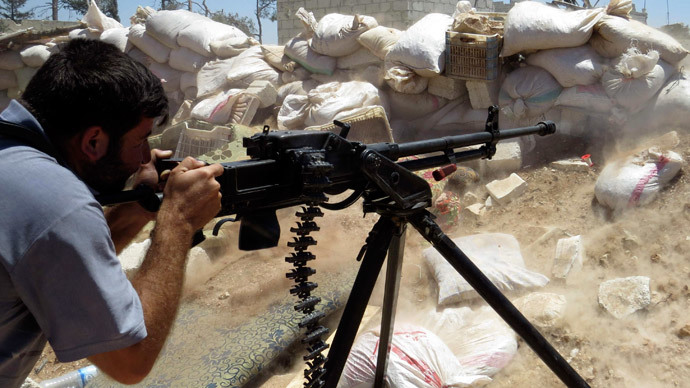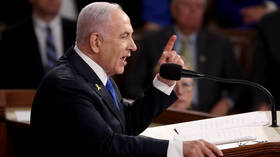The New Cold War redux and its Islamic dimension

The Cold War is well and truly over, but a new kind of ideological contest is being waged between the West (the US and its allies) and today's up-and-coming superpowers, Russia and China.
This New Cold War once again appears to divide the world into two opposing camps. In one corner the US is furiously attempting to cling to its preeminent role in global affairs (it is only six years since Professor Michael Mandelbaum argued for America acting as the world's government in his polemic The Case for Goliath). In the other, China is casually laying the groundwork for its coming greatness and Russia is securing its immediate neighborhood (or its "near abroad" if you will).
The current crisis in the Ukraine is but the latest battleground in this contest, following Syria and Libya. The successful elimination of Muammar Gaddafi and his regime in Libya led directly to the as-yet inconclusive armed attempt to remove Bashar al-Assad from Damascus. This link between Libya's "assisted rebellion" and Syria's "staged insurrection" was made abundantly clear by means of the influx of Libyan arms and fighters into Assad's homeland.
In June 2013 the New York-based internet consultancy firm Flashpoint Global Partners issued a report which confirmed "the predominant role of foreign fighters from Libya and Tunisia in Syria as per the agreement reached on Dec. 11, 2011 in Tripoli, Libya between the head of the Libyan Transitional National Council Jelil, Abdelhakim Belhadj (emir of the al-Qaeda-affiliated Libyan Islamic Fighting Group), Hamad Jabber bin Jassim al-Thani, then prime minister and foreign minister of Qatar, Youssef Qaradhaoui Rached Ghannouchi, (head of the Tunisian Muslim Brotherhood) and the number two of the Muslim Brotherhood in Syria, to send fighters and arms to Syria".
But unlike the Gaddafi regime in Libya, the government in Syria was able to withstand this assault. For more than three years now, the Assad government has successfully battled with regime opponents and now even seems to be on the brink of declaring victory. From Tehran, the Guardian's Simon Tisdall recently wrote that "Iran and its close ally President Bashar al-Assad have won the war in Syria, and the US-orchestrated campaign in support of the opposition's attempt to topple the Syrian regime has failed, senior Iranian officials have declared."
The New Cold War between the West and Russia has now moved to Ukraine, where the US, operating behind-the-scenes, has successfully escalated a crisis, functioning as a veritable proxy-conflict, that seems to have been motivated by NATO's desire to expand into Ukraine via the EU. A move that would have tremendous consequences for the US Missile Defense Shield, that under Obama differs significantly from the Bush-era missile defense program but still secures a great deal of Russian unease. Anxiety that has led Putin to announce an "S-500 air defense missile weapon system" ready for deployment by "January 2018". Meanwhile the people of Ukraine continue to suffer from the ongoing violence and mayhem, and the propaganda war continues unabated.
The hidden divide
The inhabitants of the Middle East (and the wider Islamic world by extension) appear to be equally subject to the ill-effects of an ideological rivalry, a rivalry of quite another nature however. At least, that is the claim made by the Saudi political writer Abdulmajeed al-Buluwi.
Buluwi speaks of a "Saudi-Turkey cold war for Sunni hegemony", further explaining that this ideological struggle is actually a two-pronged affair which "involves the Shiite-Sunni war being fought in Iraq, Syria, Lebanon and the Gulf, as well as a parallel Sunni-Sunni conflict involving Turkey, Saudi Arabia and political Islamic forces to control and dominate the politics of Sunni Islam".

On other occasions, I have tried to illustrate the ways in which Turkey's current AKP-led government is attempting to "Sunnify" the nation, as a precursor to a kind of Anatolian federation of Muslim ethnicities, possibly linked to a revived caliphate, as feared by many opponents of Tayyip Erdogan and his political cohorts of the Justice and Development Party (or AKP). A bolstered Sunni state in Anatolia, carrying the name of the Republic of Turkey, might very well be perceived by its Arab Sunni neighbors as an example to be emulated - particularly given its renewed economic and political clout on the international scene as a result of what I have earlier termed AKP Turkey's "pseudo-Ottoman policy". The Turkish version of Islam, though idiosyncratic in its own right, does have a lot of parallels with the approach of other nations as well, for example Pakistan or Indonesia; but, appears to be totally at odds with the Saudi take on the religion of the Prophet Muhammad.
A case in point would be the Turkish worship of the Prophet. In Islam, there is supposed to be no intermediary between the created and the Creator, between man and Allah. In fact, the only intermediary is the Prophet himself, sent down by Allah to accomplish the final revelation of the faith, but himself just a mere mortal with no supernatural powers or other miraculous properties. But his revelation of the world of Allah (as manifested in the Quran) makes him superior to all other mortals. As a result, Muslims do practice a special kind of veneration of the Prophet. But Turkey is the only Muslim nation in the world where the Prophet's birthday (or Mawlidu'n-Nabiyyi or simply Mevlit Kandili, in Turkish) is celebrated for a whole week, the 'Week of the Holy Birth'.
Turkey's current AKP-led government has cunningly appropriated this national holiday, making it compulsory for primary school children to celebrate, who are in this way inculcated with a deep love for the Prophet Muhammad. The current government in this way supports the compulsory religious education found in secondary schools (a relic of Turkey's 1982 Constitution) by hoisting this Turkish "invented tradition" (to paraphrase the late Hobsbawm's famous idiom) onto primary school children, who are thus made more susceptible to receive their compulsory immersion into the tenets of Islam in the further course of their education.
Turkey's internal religious policies also necessarily have an impact on the outside world, Muslim and beyond. But the main external manifestation of Tayyip Erdogan's policy of Sunnification can be seen in Turkey's overt and covert Syria policy. Overtly, Turkey hosts numerous [Sunni] Syrian refugees, fleeing from the Alawite dictator, while behind the scenes, Erdogan reportedly lends support to various armed Islamist factions opposing the Assad regime. In this way, Turkey is actively participating in the Sunni-Shi'a conflict that Buluwi alludes to in his above-quoted piece. Internally, Turkey under the AKP is also actively contributing to the anti-Shi'ite cause on an intellectual level.
What’s not so obvious
The academic and thinker Yusuf Kaplan wrote an account of his trip to Lebanon, Tunisia, and Libya for the Islamist newspaper Yeni Safak, as a member of a group of writers and researchers affiliated with the Islamic think tank IFAM. In his piece on the Libya trip, he relates a conversation with Nizar Kawan, a member of the Libyan Muslim Brotherhood. Explaining Kawan's contention that the Islamic world is currently facing a "counter-revolution", Kaplan clarifies that the Sunni world is now facing a double challenge: in the first instance, a challenge posed by the widening influence and authority of the Shia block and, in the second, that the Sunni world is being tested by the progress of the Salafi movement. Kaplan then reasons that on a macro level the aim of these challenges is to break the "Sunni backbone" or the power and cohesion of Sunni Islam, while on a "micro level" it is to cause internal strife within Muslim societies and to "stop" the progress of Islam. Kaplan obviously regards Shiite communities as a "heretic minority" in the Muslim world – with 200 million adherents, the Shiites (found primarily in Iran, Iraq, Yemen, Bahrain, Syria, and Lebanon) is a group within the 1.2 billion bulk of Muslims worldwide. He asserts that Shiites are creating an "atmosphere of terrorism" in Lebanon, Iraq, and the Gulf states (probably referring to the tense situation in Bahrain), whereas the Salafi movement is directly aiming at "halting""Turkey's progress" through disrupting developments in Libya, Tunisia, Algeria, the Balkans, the Caucasus, the African continent and the Turkic republics in Central Asia. His short piece reads like a statement of purpose. Even though Kaplan ends his article with the advice that Sunni Muslims, should strengthen their resolve by means of turning to mystical (or Sufi) movements in order to save the Islamic world, a statement sounding harmless enough, the piece's message is clear.

Acting as the AKP-led Turkish government's mouth-piece, Kaplan all but confirms the contention about a "Saudi-Turkey cold war for Sunni hegemony". The Saudi Kingdom adheres to a very specific interpretation of Islam, normally referred to as Wahhabi Islam meaning that Saudis or Wahhabis are the original Salafis, and that Kaplan's piece is thus really all about the Saudi-Turkish rivalry. Independent counter-extremism analyst Zubair Qamar says: "[o]bservers differ over whether Salafi are Sunni Muslims and whether they are Wahhabis. Self-described Salafis believe they are Sunni Muslims, while traditionalist Sunni critics claim that Salafis are the same as Wahhabis".
As a result, Saudi Arabia, endowed with seemingly endless Petro-Dollar wealth, has long been at pains trying to export its own version of Islam into the wider Islamic world, or put differently, the Saudis have been attempting to Wahhabize Sunni Islam (the Saudi-sponsored Mujahideen transmogrified into Taliban in Afghanistan and Pakistan immediately spring to mind). Recently, the renowned journalist Patrick Cockburn put forward that the "'Wahhabisation' of mainstream Sunni Islam is one of the most dangerous developments of our era. Ali Allawi, the historian and authority on sectarianism, says that in country after country, Sunni communities 'have adopted tenets of Wahhabism that [were] not initially part of their canon'. Other Islamic believers such as the Shia and Sufi are denounced as apostates or heretics who are no longer Muslims", adding that the "crucial feature in the rise of Wahhabism [or Salafism] is the financial and political might of Saudi Arabia". And according to people like Buluwi and Kaplan, this rising influence of Wahhabi or Salafi Islam is a direct challenge to Turkey, as the self-proclaimed regional superpower in the Islamic world and heir to the proud ottoman tradition.
On the one hand, Turkey and Saudi Arabia seem to cooperate in the fight against Shia Islam, as evidenced by their joint efforts in Syria. Besides, they do business – a statement on Turkey’s Ministry of Foreign Affairs (MFA)'s website says that Turkish and Saudi foreign policy perspectives mutually support each other and create synergy." It continues, "[A]fter the global economic crisis in 2009 Turkey-Saudi Arabia bilateral trade volume has been in recovery tendency. Trade volume between the two countries reached 4.66 billion USD in 2010. The number of Turkish companies, mainly in [the] contracting sector, which undertake huge projects in Saudi Arabia is increasing continuously. Similarly, there is [also] a growing interest in Saudi business circles to[wards] Turkey. [The numbers of] Saudi tourists visiting Turkey [has risen] significantly ... every year since 2005. The recorded number of 84.000 Saudi tourists in 2010 is expected to rise considerably in 2011". In 2012, there was a 98% increase in the number of Saudi visitors to Turkey.
Still, in spite of this rosy government rhetoric, the behind-the-scenes "Saudi-Turkey Cold War for Sunni hegemony", postulated by Buluwi, seems to have all the makings of a serious strife bound to seriously upset the Middle East and the wider Islamic world in the coming years. The simmering rivalry was arguably brought out in the open when the Saudi Kingdom "formally designated the Muslim Brotherhood as a terrorist organization" last March. Even though this move was widely seen as part of a Saudi offensive against Qatar, an important supporter of the Brotherhood, ostracizing Hasan al-Banna's movement also came as a blow to Turkey's leadership. Tayyip Erdogan is a well-known sympathizer of the movement, with some of his critics, such as the French journalist Thierry Meyssan, even claiming that he is personally affiliated with this pan-Arab movement. Syria's Assad views Erdoğan's ties with the Muslim Brothers as having shaped Turkey's extreme championing of the armed opposition against his regime. Tayyip Erdogan is also one of the ousted Egyptian President Mohammed Morsi's most outspoken champions. Buluwi posits that "Turkey's AKP government is considered the main sponsor and supporter of political Islamic movements in the region", a perception that is highly resented by the Saudi rulers, who are more interested in reconstructing the rest of the Islamic world in their own image - politically autocratic and religiously intolerant. In this context, Turkey is perceived as a an ally or even a patron of the Brotherhood, with Erdogan's attempts to impose an Islamic Nanny State on the population of Turkey as mirroring the aims and goals of the Muslim Brothers.
Will the future see an open conflict between Saudi Arabia and Turkey? Will Turkey, as heir to the Ottoman tradition, attempt to eradicate the Saudi hold over the wider Islamic world or will Turkey's pragmatic pseudo-Ottoman stance prevail once more to grease the wheels of commerce connecting the Arab peninsula and Anatolia?
The statements, views and opinions expressed in this column are solely those of the author and do not necessarily represent those of RT.
The statements, views and opinions expressed in this column are solely those of the author and do not necessarily represent those of RT.













